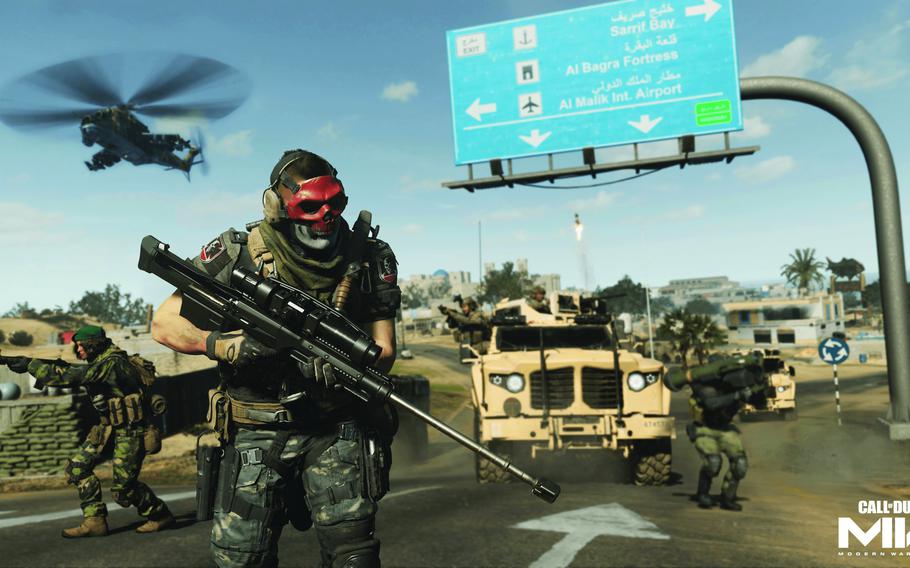
The U.K. competition authority ruled that the combination would give Microsoft too much power in the fast-growing cloud-based video games market. Microsoft already owns the popular gaming console Xbox, and the deal would give it control of some of the most popular game franchises including Call of Duty, World of Warcraft, Overwatch and Candy Crush. (Call of Duty: Modern Warfare 2 Screenshot)
U.K. regulators blocked the largest deal in Microsoft's history Wednesday, barring its $69 billion purchase of gaming company Activision Blizzard in a signal of the mounting global scrutiny of large American tech companies' power.
The U.K. competition authority ruled that the combination would give Microsoft too much power in the fast-growing cloud-based video games market. Microsoft already owns the popular gaming console Xbox, and the deal would give it control of some of the most popular game franchises including Call of Duty, World of Warcraft, Overwatch and Candy Crush.
Microsoft already accounts for an estimated 60 to 70 percent of global cloud gaming services, and it has other advantages because of its existing Xbox business and cloud computing services, the U.K. regulator concluded.
"Microsoft already enjoys a powerful position and head start over other competitors in cloud gaming and this deal would strengthen that advantage giving it the ability to undermine new and innovative competitors," Martin Coleman, chair of the independent panel of experts conducting the Competition and Markets Authority's investigation, said a statement.
The decision reflects mounting legal challenges confronting Microsoft, as it seeks to close a deal that is critical to its ambitions in gaming and the "metaverse," virtual experiences that have been a key area of investment for the tech giant and its competitors. The Federal Trade Commission last year sued to block the deal in the United States, arguing the acquisition would squash future innovations. The European Commission has also opened an investigation into the deal.
The U.K. action cements the country's increasingly formidable role regulating major American tech companies, following its withdrawal from the European Union. The CMA has previously been successful in scuttling major American tech deals, previously forcing Facebook parent company Meta to sell Giphy, which enables users to share animated photos and videos called GIFs.
It also marks a rare victory for U.S. antitrust enforcers, who have promised sweeping actions to address consolidation in Silicon Valley. Yet their efforts have run into hurdles, as legislation that would update U.S. competition laws languishes in Congress, and U.S. judges reject some of their arguments about the ways tech companies abuse their power.
"We also have concerns, as explained in our complaint, about the anticompetitive effects of this deal," said Holly Vedova, director of the FTC's Bureau of Competition, in a statement. The FTC has argued that the deal would give Microsoft the ability to thwart competitors by withholding these games from competing game systems entirely, or by manipulating pricing and degrading game quality on rival consoles.
Microsoft has launched a global charm offensive to counter concerns about the deal, which it first announced more than a year ago. Microsoft Vice Chair Brad Smith said the software giant is fully committed to the deal and would appeal the U.K.'s move.
The decision "rejects a pragmatic path to address competition concerns and discourages technology innovation and investment in the United Kingdom," Smith said in a statement.
Microsoft said it was paying $69 billion for Activision when the deal was announced in January 2022. But some calculations value the deal closer to $75 billion, given the current pricing of Activision's outstanding shares.
The U.K. regulator rejected a proposal from Microsoft that would have set out requirements governing which games must be offered to certain platforms, and on what conditions, something that would have played out over a 10-year period. It also said Microsoft's proposal was not sufficiently open to providers who might want to work on systems other than Windows. Such an agreement would also put too much regulatory oversight over individual games and platforms, it said.
The U.K.'s action comes as it faces at times competing pressures to both regulate and promote the tech sector, amid broader economic challenges. The United Kingdom unveiled a new bill Monday that would give regulators greater powers to fine tech giants if they don't abide by rules to give customers more transparency and choice. Yet at the same time, the government has also stated that it wants to become a destination for innovators, especially in artificial intelligence.
Activision spokesman Joe Christinat said in a statement that the move contradicts what the United Kingdom has said about its ambitions to encourage tech development.
"We will reassess our growth plans for the UK. Global innovators large and small will take note that — despite all its rhetoric — the UK is clearly closed for business," he said in a statement.